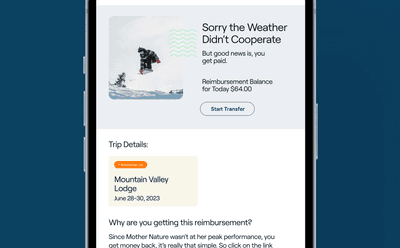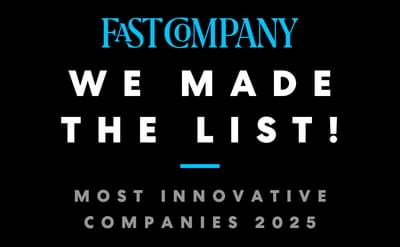
Dive Into The Deep End
All learning involves risk to some extent. In order to grow, you have to do new things.
By Alice Fuller
December 29, 2022
I’ve taken on challenges that feel so new, big, and scary that it can feel like I’m staring over an abyss. These challenges, while daunting, have resulted in some of my most profound periods of growth and learning.
For most of our careers and our lives, we learn incrementally: tackling tasks similar to those we’ve done before, reading books or blogs to improve our skills, or taking the next level of a course. But every once in a while we have the opportunity to push ourselves to jump into something new—something bigger, scarier, and riskier.
This could be leading your first project, changing jobs, changing careers, or traveling to a country and immersing yourself in a new language. These bigger shifts are not to be taken lightly. They are and should be infrequent, and are generally the moments when we truly level up, learning and accomplishing more than we thought was possible when we started.
That’s diving into the deep end.
In my next two blog posts, I’ll be exploring how to best set yourself up for success when diving into the deep end—reflecting on when you should take the plunge, and where you can find the opportunity to do so.
Going in head-first is daunting, but there are things we can do to prepare and set ourselves up for success.
The first is figuring out how to embrace uncertainty. The second is to practice and become comfortable with the idea that failure is necessary for learning.
Embrace uncertainty
When you try something new, you often won’t be certain of where to start or what to do. This is a good sign! It means you’re pushing yourself and that you’ll grow from this experience.
But it’s also easier said than done, so it’s good to get in some practice and have a few risk-taking tools on hand.
The first tool is a firm grasp of how to evaluate risk. Work and career-based risks are predominantly risky for our ego. Begin by assessing what is actually at risk. If it’s a big risk (like your financial well-being) then it’s important to act accordingly. If, however, the risk is ultimately rooted in the fear of how others might view your failure, that’s a risk to your ego. Quickly and rationally assessing risk will enable you to take on more challenges with greater confidence.
Luckily for us, this post is focused specifically on work-related risks, which generally aren’t that risky, when you really stop to think about it.
Risk-taking of any kind is a muscle that can be conditioned. Acknowledge this fact, and then find small ways to try taking risks.
Practice your skills at assessing. How bad will it be if I fail? What are the possible outcomes of success? And what can I do to make a positive outcome more likely? After each of these moments, stop and reflect: was my initial analysis of the risk level correct?
How did it feel to take that risk?
Some simple starter suggestions: voice an opinion or an idea, lead a meeting, or volunteer to mentor someone.
Practice decision making
The next tool is to be comfortable with making decisions yourself.
It’s important to be thoughtful and take input from others when making decisions, but part of growth is starting to hold yourself accountable for making a final call. To build this tool, practice making decisions.
This can feel uncomfortable at first, so practice making decisions 100% on your own in low-risk situations to get the feel for it.
When I go to a bar with friends, I tend to poll the group for what they’re ordering, what they think a specific cocktail might be like, or which one they think I should order. I know this about myself, so I give myself the decision-making assignment of, “order your cocktail with zero input, see how you feel”. It’s silly—but it helps!
The last tool is having a practice of reflection and a way to build in pauses. Stress can trigger our natural fight-or-flight instincts, so remind yourself to take a breath. If you’re asked a question you don’t know the answer to, feel free to just say, “That’s a great question, let me get back to you”. Find ways to allow yourself to set the pace of a situation so you can feel in control.
As for the practice of reflection, I’ve embraced journalling, and have a “work diary”. I set aside time to write in free form and see what ideas get unlocked.
Find a reflective practice that works for you now, that way you’ll have it handy when you take on a big challenge and you really need it to sort through the whirlwind of thoughts... or the lack thereof.
Learn from failure
Taking on a new challenge means more chances for failure. This is good—not bad.
Find comfort in learning from moments of failure. One of my favorite ways to frame failure and struggling is to examine it within a structure called the “4 stages of Competence”:
- Unconscious Incompetence
- Conscious Incompetence
- Conscious Competence
- Unconscious Competence
The idea behind this framework is that you start out not knowing that you don’t know things yet. Blissful ignorance. And then you learn a little more and realize that there are things you don’t know; you begin to have a sense of insecurity, resistance, and failure.
Next, you start to become competent at what you are doing but it takes a lot of conscious effort and thought. In the final stage, Unconscious Competence, you no longer have to think about or work hard at the thing you can just do it.
This cycle will likely repeat itself over and over as you progress in your skills and career.
But why do I bring this up?
This framing allows me to view moments of “Oh wow, this is hard—I’m not good at this” as evidence that I’ve leveled up in the stages of competence from Unconscious Incompetence to Conscious Incompetence. Taking a moment of “failure” and recognizing it instead as a moment of “learning and progressing”.
Now, I can take a clear-headed look and figure out how to move up to the next wrung of Competence.
Bias towards action
Another piece of the puzzle that will enable you to learn from failure is to bias toward action.
You need “failure” and feedback to learn. To create moments to fail you must take action. Take action, share your work, and seek out feedback.
Have you heard the common entrepreneurial advice to “fail fast”? I don’t love that phrasing (as there is too much emphasis on the “fail” aspect) but the fundamental idea of producing work, taking action, sharing that work, receiving feedback, and iterating, is truly the best way to level up quickly.
There’s a reason that as children we are typically put into classes and teams. We are unlikely to learn how to play soccer if we are just handed a soccer ball and told to go teach ourselves in a corner. Why would we assume as adults that we could learn in a vacuum?
Given that I’m talking about diving into the deep end (and what a great tool it is for learning), it might be assumed that one should do that constantly. This, however, will not work.
In order for the practice to pay off one must take the jump, commit to it, and see it through. This means that to prepare for these moments, we must first build grit. According to Angela Duckworth, “grit is passion and perseverance for long-term goals”. It's the piece of the puzzle that will help cement a chance for floundering into a chance for profound growth.
I could go on about how to build grit and what it is, but Duckworth has a wonderful book on this topic, Grit: The Power of Passion and Perseverance, so I’ll direct you toward her writing on the matter. Two highlights I’ll share now are that grit is one of the best indicators of who will be successful and that grit is a skill that can be built and worked on.
My final (and arguably easiest) piece of advice is to take heart in listening to stories of folks who have dealt with setbacks in their lives, have failed, been bad at things, and managed to find their own version of success.
I’ve found that BBC's Desert Island Disks podcast has several amazing stories of folks whose life paths involved many twists and turns. It’s a wonderful reminder that even if I’m feeling in a trough right now, others before me have been here and have found ways to flourish.
What are you waiting for?
Start practicing making decisions, building a practice of reflection, and embracing moments of struggle as you level up.
Next time, we’ll tackle how to know when you're ready to dive into the deep end, and how to seek out and make those opportunities happen.

What is a Weather Guarantee?
Weather conditions can have a significant impact on the guest experience, especially for outdoor activities. The Weather Guarantee from Sensible Weather is a…

Sensible One of Fast Company's Most Innovative Companies
Sensible Weather named one of FastCompany's Most Innovative Companies in the world for 2025.

What is 1.5mm of Precipitation Per Hour?
1.5mm per hour of rain, what does 1.5mm of rain look like.

A note on the Los Angeles wildfires
How to help in the wake of the devastating wildfires in the LA area.
Connect with our team
Want to learn more about how Weather Guarantees can help your business? Schedule a call with a member of our Partnerships team today!
